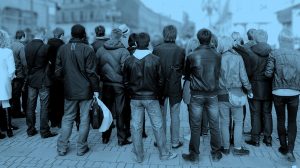Tech & Science dictionary
bystander effect
[ bahy-stan-der ih-fekt ]
What is the bystander effect?
The bystander effect is a phenomenon in which an individual person is less likely to intervene or assist in an emergency, crisis, or altercation that they are witnessing due to the presence of other people also witnessing it.
For example: When a person is struck by a car in front of multiple witnesses, individuals in the crowd may not (or may not initially) check on the victim or call for help. The inaction of these witnesses is often attributed to the bystander effect. Though many factors may be involved, it is often thought to be due to each person assuming that someone else will come forward to help—or each person preferring that someone else would.
According to research on the bystander effect, the likelihood of a person taking action in such a situation actually decreases in proportion to how many people are present. In contrast, it’s more likely for a single person to intervene when no one else is around.
Where does bystander effect come from?

The word bystander means “a person present but not involved; spectator; onlooker.” In other words, a bystander is sometimes who stands by but does not get involved or take action.
The word effect is often used in the names of psychological phenomena, such as the placebo effect and the Mandela effect.
Researchers Bibb Latane and John Darley popularized the concept of the bystander effect in the late 1960s. Latane and Darley conducted multiple experiments to study bystander inaction following the 1964 murder of Kitty Genovese, which drew widespread media attention due to reports that none of the at least 38 people who witnessed the incident attempted to intervene or call the police. Though these reports were later revealed to be inaccurate, the case became well-known and closely associated with the term bystander effect. The term itself has since become common among researchers as well as in popular discussion of such incidents.
Psychologically, the bystander effect is often attributed to people being influenced by the inaction of others around them, or to what psychologists call diffusion of responsibility, which refers to a phenomenon in which people feel less personal responsibility when there are more people around them.
It is mainly discussed in the context of emergencies and cases involving violent crime. For example, the bystander effect is commonly cited as a reason for bystander inaction during instances of sexual assault.
Examples of bystander effect
Who uses bystander effect?
Use of the term bystander effect has become common among researchers studying the phenomenon as well as in news stories and discussion about such events.
Bystander effect is happening on so many levels. The more we are exposed.. the less we do something about it.
— Lex Jay (@lexisjanay) June 11, 2022
bystander effect is real. if you see something, do something! dont wait around for no one else to do something
— stephひ (@sdragon333) June 17, 2022
Work night out ended with providing first aid to a complete stranger who’d fell and busted her nose then finding her a taxi.
The bystander effect is the idea that someone else will help.
Be the someone else.— TwistedDoodles (@twisteddoodles) December 15, 2018
Note
This is not meant to be a formal definition of bystander effect like most terms we define on Dictionary.com, but is rather an informal word summary that hopefully touches upon the key aspects of the meaning and usage of bystander effect that will help our users expand their word mastery.